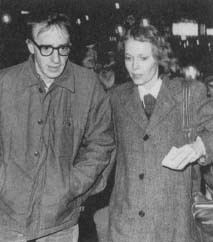Woody Allen-Mia Farrow Custody Trial: 1993
Life Imitating Art?
The battle was joined. Legions of fans were both confused and disappointed. The news media, while proclaiming that all its major sources in the story were the principals themselves, also chased every rumor and interviewed whoever had an opinion. Film buffs wondered how tarnished the reputation of their idol, Allen, would become. Cashing in on the publicity, Allen's studio advanced the opening date of his new movie, Husbands and Wives, in which he starred with Farrow and which, according to advance notices, mimicked their real-life breakup and custody battle. The studio announced that the film would be released nationally, rather than in only eight cities, as had previously been scheduled.
 Woody Allen and Mia Farrow before their breakup.
Woody Allen and Mia Farrow before their breakup.
At a preliminary hearing, New York Supreme Court Justice Phyllis B. Gangel-Jacob turned down Allen's request for visitation rights with the children. She also refused to accept, from Farrow's lawyers, Allen's photographs of Soon-Yi in the nude—pictures that Farrow had found on the mantel-piece in her home and that had tipped her off that the affair was going on.
By October 1992, the case had become fuel for the raging political fires of the U.S. presidential election year—one of whose themes was family values. U.S. Attorney General William P. Barr, quoting an Allen interview in Time, said, "After all, he [Allen] said 'the heart wants what the heart wants.' There you have it. In seven words, Allen epigrammatically captures the essence of contemporary moral philosophy." U.S. Representative Newt Gingrich, known for preaching family values as a Republican strength, told a Georgia audience, "Woody Allen is currently having nonincest with a non-daughter for whom he is a non-father because they have no concept of families … it's a weird environment out there."
Next came a wave of hearings and rulings. Acting New York Supreme Court Justice Elliott Wilk ruled that television cameras would be allowed into the court during future hearings and during the trial. Both sides immediately appealed, so Administrative Judge Stanley S. Ostrau barred both TV and radio coverage in his courtroom. Meanwhile, Farrow sued in Surrogate's Court to nullify Allen's adoption of Moses and Dylan.
In a December 15, 1992, hearing, Justice Wilk ruled that Farrow must provide Allen a copy of a videotape in which Dylan reportedly said Allen molested her. Wilk also turned down Farrow's request that Allen's suit for sole custody be put on hold pending the outcome of her suit in Surrogate's Court.
On March 18, 1993, a team of psychological investigators at Yale-New Haven Hospital cleared Woody Allen of sexually molesting Dylan. The findings, which were the results of repeated interviews with Allen, Farrow, Dylan, the child's psychologist, and household servants, were not made public. However, Allen's lawyers reported that the videotape on which Farrow had based the accusation was a result either of the child's imagination or of someone else's manipulation.
Additional topics
Law Library - American Law and Legal InformationNotable Trials and Court Cases - 1989 to 1994Woody Allen-Mia Farrow Custody Trial: 1993 - Life Imitating Art?, The Custody Trial Begins, The Aftermath